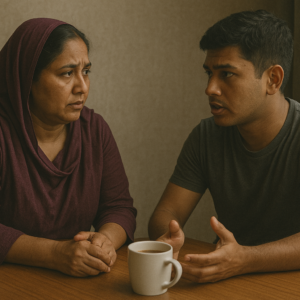Silent Distance: Why Mother-Child Ties Deteriorate

When Bonds Break: How Mother-Child Bonds Weaken
The relationship between a mother and child is often described as sacred, profound, and everlasting. Yet, reality can sometimes paint a different picture. As children grow, the bond that once seemed unbreakable can weaken, fray, or even snap altogether. Understanding why the mother-child relationship deteriorates is essential — not only to heal wounds but also to prevent further damage. In this article, we’ll explore the causes, signs, impacts, and ways to rebuild this critical connection.
Understanding the Mother-Child Bond
From the moment of birth, a deep emotional connection forms between a mother and her child. This bond is based on love, trust, security, and nurture. It is the foundation of a child’s emotional development, shaping how they see themselves and relate to others throughout life.
However, just like any relationship, the mother-child bond requires care, communication, and mutual respect to thrive. Without these elements, even the strongest ties can weaken over time.
Common Causes Behind the Deterioration
Several factors can lead to the weakening of the mother-child relationship. Some develop subtly over years, while others erupt suddenly during challenging periods.
1. Communication Breakdown
When communication falters, misunderstandings and resentment build. A mother and child who once spoke freely might drift into silence or hostile conversations. Differences in opinion, lifestyle choices, and expectations can fuel arguments instead of understanding.
2. Lack of Emotional Validation
Children, no matter their age, need to feel heard and validated. When mothers dismiss or belittle their child’s feelings — intentionally or unintentionally — emotional distance grows. A child who feels unseen may stop seeking comfort from their mother altogether.
3. Overprotectiveness and Control
While mothers often act out of love, excessive control can feel suffocating. Overprotectiveness can hinder a child’s independence, leading to rebellion, resentment, or emotional withdrawal.
4. Unrealistic Expectations
Expecting children to conform to specific academic, professional, or personal goals without considering their individuality can strain the relationship. Children who feel they are “never enough” may distance themselves to preserve their self-worth.
5. Childhood Trauma and Abuse
Physical, emotional, or psychological abuse leaves deep scars. Even neglect — often overlooked — can erode trust permanently. In such cases, the relationship might deteriorate beyond repair unless active healing efforts are made.
6. Life Transitions
Major life changes like divorce, death, financial struggles, or relocation can destabilize family dynamics. If not handled with empathy, these events can sow seeds of bitterness and mistrust.
7. Influence of External Relationships
As children grow, friendships, romantic partners, and in-laws can influence how they perceive and interact with their mothers. If these external relationships encourage estrangement, tensions may escalate.

Signs That the Mother-Child Relationship Is Suffering
Recognizing the warning signs early is critical to addressing issues before they become irreparable.
- Reduced communication: Conversations become rare, superficial, or tense.
- Persistent conflict: Arguments escalate quickly and often end unresolved.
- Emotional distancing: One or both parties become emotionally unavailable.
- Lack of trust: Either the mother or child feels unsafe sharing thoughts or feelings.
- Resentment and anger: Past mistakes are frequently brought up, fueling negativity.
- Feeling obligated: Interactions are based on duty rather than genuine desire.
- Avoidance: One or both actively avoid spending time together.
Psychological Impact of a Broken Mother-Child Relationship
A deteriorating mother-child relationship leaves emotional imprints that can last a lifetime.
On the Child
- Attachment Issues: Difficulty forming healthy relationships in adulthood.
- Low Self-Esteem: Constant criticism or neglect erodes self-worth.
- Mental Health Struggles: Anxiety, depression, and trust issues often stem from strained parental bonds.
- Identity Crisis: A weak relationship with the primary caregiver can confuse a child’s sense of self.
On the Mother
- Guilt and Regret: Many mothers grapple with deep guilt when relationships sour.
- Loneliness: Losing emotional connection with a child often leads to isolation.
- Mental Health Decline: Depression and anxiety can develop or worsen when maternal bonds are broken.
Cultural Factors That Influence Deterioration
Culture plays a crucial role in shaping expectations in the mother-child dynamic.
In many Asian, African, and Latin American cultures, filial piety — extreme respect and duty toward parents — is expected. When children pursue independence that clashes with traditional expectations, relationships can sour.
In Western cultures that prioritize individualism, emotional distance is sometimes seen as natural or even necessary, especially during adolescence and adulthood.
Recognizing these cultural differences can help both mothers and children better understand and bridge the gaps.
Can Broken Mother-Child Relationships Be Repaired?
In many cases, yes — but it requires sincere effort from both sides. Healing is a process, not a one-time event. Here are critical steps toward reconciliation:
1. Open and Honest Communication
Address the elephant in the room. Speak openly about feelings without blaming. Use “I” statements rather than “you” accusations.
Example:
Instead of saying, “You never listen to me,”
say, “I feel hurt when I don’t feel heard.”
2. Set Boundaries
Healthy boundaries promote respect and understanding. Discuss and agree on boundaries regarding time, advice, and expectations.
3. Seek Therapy
Family therapy or individual counseling can offer a safe space to process pain and rebuild trust. A professional mediator often helps when emotions run too high for constructive dialogue.
4. Acknowledge and Apologize for Past Hurts
Whether intentional or not, past wrongs need acknowledgment. A sincere apology can be a powerful catalyst for healing.
5. Focus on Building New Memories
Rather than dwelling on past hurts, work toward creating new positive experiences together. Small gestures, like cooking together, traveling, or simply having regular coffee dates, can reignite the bond.
6. Practice Patience
Healing emotional wounds takes time. Setbacks are normal. Celebrate small improvements instead of demanding perfection.

When Reconciliation Isn’t Possible
Sometimes, despite best efforts, reconciliation may not happen — and that’s okay. Emotional well-being should never be sacrificed for forced relationships.
If the mother-child bond is abusive or toxic, setting permanent boundaries may be necessary for both parties’ mental health.
Healing, in such cases, comes from acceptance, self-care, and creating nurturing relationships elsewhere.
The Role of Forgiveness
Forgiveness is not about excusing harmful behavior. Instead, it’s about freeing oneself from the burden of anger and resentment. It’s a personal journey and often a crucial part of moving forward, whether or not the relationship is restored.
Preventing Deterioration: Tips for Mothers
Mothers often have the ability to guide the emotional tone of the relationship. Here are some preventive tips:
- Listen more, lecture less: Children need space to express themselves without fear of judgment.
- Support independence: Encourage children to make their own choices while offering guidance when asked.
- Validate feelings: Even if you disagree, acknowledge your child’s emotions.
- Apologize when wrong: Modeling humility teaches children that mistakes are part of growth.
- Stay curious: Continue learning about your child’s evolving interests, challenges, and dreams.
Preventing Deterioration: Tips for Children
Children (even grown ones) also hold power in maintaining strong bonds:
- Communicate openly: Share your thoughts and feelings respectfully.
- Show appreciation: Small gestures of gratitude can strengthen bonds.
- Accept imperfections: Understand that mothers are human, too, with flaws and struggles.
- Set realistic expectations: Avoid idealizing or demonizing your mother.
- Invest time: Relationships, like gardens, need regular tending to thrive.
Mother-Child Relationships in Bangladeshi Families
In Bangladesh, the mother-child bond is deeply respected and emotionally powerful. However, cultural expectations can sometimes strain this relationship. Mothers often sacrifice their dreams for their children’s success, leading to high expectations around education, careers, and marriage. When children make independent choices, misunderstandings and hurt feelings can arise.
Generational gaps also play a role. Younger Bangladeshis grow up with global influences that can clash with traditional family values. Moreover, emotional expression is often indirect — shown through actions rather than open conversations — which can leave children feeling emotionally distant despite deep love.
Bridging this gap requires honest dialogue, mutual respect, and understanding that both love and relationships must evolve with time.
Healing is Always Possible
The mother-child bond is one of life’s most profound connections. While deterioration can be painful, it’s rarely irreversible. With open hearts, empathy, and persistent effort, many relationships can be mended — sometimes even stronger than before.
Remember, the goal isn’t to return to the way things were but to create a new, healthier dynamic where both mother and child can thrive.
No matter how broken a bond may seem, healing is always within reach — if both sides are willing to try.
Struggling family dynamics often connect to deeper social patterns. Explore how cultural pressures shape emotional struggles in another way:
Toxic Masculinity in Bangladesh: How Cultural Norms Are Harming Men Too









